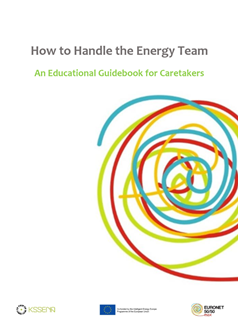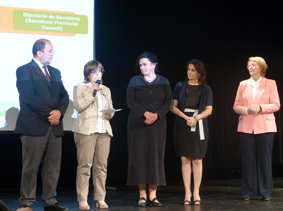News
Energy savings achieved in Slovenian schools
Passing the baton in the School Complex in Čáslavice, Czech Republic
News from Cyprus
In total 40 teachers and 136 students are directly involved in the project, while more than 1900 are involved indirectly. Dedicated meetings were attended by the headmaster, the teachers coordinating the work of the energy team and - in some cases - also the students participating in the team. CEA\'s staff explained the attendants how to implement the 50/50 methodology step by step, how to use presented measuring devices, as well as went through the educational booklet and the lesson scenarios in order for the teachers to feel comfortable with them. Before the meetings, the schools were also asked to gather and provide electricity and heating bills, which will be later used to calculate the energy savings.
The overall feedback received from schools was positive and encouraging! The teachers highlighted that educational boxes will facilitate their work with the energy teams a lot. The students were really enthusiastic with the measuring devices, the posters and other material provided. The headmasters and teachers understood the 50/50 methodology and committed to engage all building users in the school’s efforts to save energy.
Evaluation of the first year of implementation of the 50/50 concept
The 1st cycle of implementation of the 50/50 methodology has been completed and it's time for its evaluation! We asked representatives of schools and other public buildings involved in the project about their experiences, opinions and suggestions for the future. Two questionnaires were prepared (for schools and for other buildings) and translated into all project languages. The feedback was collected via an e-form, which significantly simplified the process.
In total 314 schools and 12 other public buildings filled in the questionnaire and the feedback received was very positive. Most of the schools consider the project very interesting and useful, both from the pupils' and the teachers point of view. They believe that it has a lot of positive impacts and that - as a result - energy awareness, knowledge and consumption habits of the building users have changed a lot. There are, however, also some challenges that need to be tackled. The biggest one is finding time for project activities in the - rather hectic - everyday work schedule. The school days are full of action, the requirements of the curriculum need to be fulfilled and there are already many other projects going on. It is also challenging - especially in bigger schools - to get the whole school community involved, interested, aware and active. Still, the teachers put a lot of effort to successfully implement all steps of the 50/50 methodology, as they are convinced that saving energy and protecting the environment are so important, that they should be fitted in the school agenda anyway.

The experiences of the schools
EURONET 50/50 MAX on Facebook!
 We are pleased to announce that now you can follow our activities, as well as activities and achievements of schools and other public buildings involved in the 50/50 Network, on Facebook. Join us not only to learn from the others but also to share your valuable experience and opinions!
We are pleased to announce that now you can follow our activities, as well as activities and achievements of schools and other public buildings involved in the 50/50 Network, on Facebook. Join us not only to learn from the others but also to share your valuable experience and opinions!
There are over 500 schools, 60 municipalities and 48 other public buildings already involved in the EURONET 50/50 MAX project. Each of them has its own experience in energy education, energy saving and working with the energy teams. Use the opportunity to learn from them, get inspired by them and also share your own achievements, best practices and useful tips!
Link to our English Facebook profile is following: https://www.facebook.com/EURONETMAX
You may also follow country-level disputes on national Facebook profiles administered by EURONET 50/50 MAX partners. They can be accessed from different language versions of this website.
Once again, we would like to invite you to join our energy-saving community!
How to handle the energy team? Find answers in our new guidebook
 Our new guidebook entitled “How to handle the energy team” contains many useful tips how to organise energy tour around the school building and to help children analyze energy situation of their school. The publication is addressed to school caretakers who play very important role in the 50/50 project. As they best know the building, its energy system and appliances in use, they can help students find out how and where energy is used at school, as well as support them in implementation of energy-saving measures.
Our new guidebook entitled “How to handle the energy team” contains many useful tips how to organise energy tour around the school building and to help children analyze energy situation of their school. The publication is addressed to school caretakers who play very important role in the 50/50 project. As they best know the building, its energy system and appliances in use, they can help students find out how and where energy is used at school, as well as support them in implementation of energy-saving measures.
In the publication the caretakers will find guidelines how to organise the work with the energy team, how to prepare energy review of the school building, how to communicate with children and how to thoroughly discuss all energy sources used at school and necessary to its normal operation. The guidebook will also help caretakers to prepare for the possible questions raised by the pupils.
Although the guidebook is addressed to caretakers, also the teachers involved in the 50/50 project are invited to read the document. They will find here many useful information which they can use during their work with children, including information about model, low-cost energy-saving measures and modern technological solutions for clean and efficient energy production. It is worth to discuss them with students to increase their knowledge about energy production and consumption, however it should be remembered that bigger energy-related investment are not included in the EURONET 50/50 MAX project.
Corso di formazione per i comuni, le scuole e gli edifici non scolastici coinvolti in EURONET 50/50 MAX
Attualmente i partner di progetto sono impegnati nel coinvolgimento delle scuole e degli edifici non scolastici nel progetto Euronet 50/50 MAX. Il nostro compito non è facile, in quanto dobbiamo coinvolgere 500 nuove scuole e altri 50 edifici pubblici, ma l'interesse per l’azione 50/50 è grande e sempre più istituzioni aderiscono alla rete 50/50.
Al fine di aiutare i nuovi membri della rete ad attuare un progetto 50/50 stiamo organizzando delle sessioni informative nazionali, durante le quali vengono discussi in maniera approfondita i diversi aspetti del progetto. I partecipanti imparano come implementare la metodologia 50/50 passo dopo passo e come calcolare il risparmio energetico raggiunto nel corso dell’attività. Ma acquisiscono anche familiarità con i modelli di accordo tra autorità locali e i fruitori degli edifici scolastisti/non scolastici coinvolti nel progetto, nonché con i processi di valutazione . Presto, troverete qui maggiori informazioni sugli eventi organizzati nei diversi paesi .
Se non siete ancora parte del progetto, ma vorreste attuare la metodologia 50/50 nel vostro edificio, contattateci all'indirizzo Questo indirizzo email è protetto dagli spambots. È necessario abilitare JavaScript per vederlo..
La prima edizione del progetto EURONET 50/50 ha vinto il Sustainable Energy Europe Award 2013!
 Siamo molto felici di informarvi che la prima edizione del progetto EURONET 50/50 ha vinto il Sustainable Energy Europe Award 2013 nella categoria "Learning"! I premi sono assegnati dalla Commissione Europea al fine di dare un riconoscimento istituzionale ed aumentare la visibilità delle migliori iniziative legate all’energia sostenibile ed attuate a livello europeo. Quest'anno sono stati presentati 244 progetti, quindi la gara è stata molto dura!
Siamo molto felici di informarvi che la prima edizione del progetto EURONET 50/50 ha vinto il Sustainable Energy Europe Award 2013 nella categoria "Learning"! I premi sono assegnati dalla Commissione Europea al fine di dare un riconoscimento istituzionale ed aumentare la visibilità delle migliori iniziative legate all’energia sostenibile ed attuate a livello europeo. Quest'anno sono stati presentati 244 progetti, quindi la gara è stata molto dura!
La cerimonia di premiazione si è tenuta a Bruxelles il 24 giugno, nell'ambito della Settimana Europea dell'Energia Sostenibile. Il premio per Euronet 50/50 è stato ritirato dai rappresentanti del Consiglio Provinciale di Barcellona, coordinatore del progetto .
Il premio dimostra che il progetto EURONET 50/50 è stato un grande successo e che la metodologia 50/50 può essere ulteriormente promossa tra le autorità pubbliche europee, i centri educativi e i dirigenti di altri edifici pubblici. Siamo dunque convinti che la nuova edizione del progetto EURONET 50/50 MAX porterà risultati ancora più importanti!
Al via il progetto EURONET 50/50 MAX
Siamo lieti di annunciare che il progetto EURONET 50/50 MAX è stato ufficialmente lanciato nel corso di una riunione di progetto e di una conferenza pubblica a Bruxelles il 13 e il 14 maggio.
La conferenza 50/50 dal titolo "Responsabilizzare e incentivare gli utenti a risparmiare energia nelle scuole e negli edifici pubblici" ha avuto come obiettivo la diffusione dei risultati del primo progetto Euronet 50/50 e la promozione del concetto 50/50 tra le istituzioni europee. L'evento è iniziato con le presentazioni della Commissione europea (rappresentanti dell’EACI, responsabile del programma Energia intelligente, e dalla DG Istruzione e Cultura ) e dell’ufficio del Patto dei Sindaci, i quali hanno sottolineato il contributo del progetto al raggiungimento degli obiettivi climatici ed energetici europei .
La conferenza ha dato anche l'opportunità di conoscere le esperienze passate e i successi relativi all'attuazione della metodologia 50/50. Presentazioni interessanti sono state fatte dai rappresentanti della città di Amburgo (prima città che ha applicato la metodologia 50/50!) , del consiglio di Cornellà e di una delle scuole finlandesi (Länsimetsän Koulu). La conferenza è stata anche l'occasione per informare ufficialmente i partecipanti del lancio della seconda edizione del progetto EURONET 50/50, intitolato EURONET 50/50 MAX. Il nuovo progetto otterrà maggiori risultati coinvolgendo 500 nuove scuole nella Rete 50/50 e testando la metodologia 50/50 in altri edifici pubblici.
La conferenza è stata accompagnata da una riunione dei partner di progetto, durante la quale si è discusso dei compiti e dei risultati da raggiungere in futuro a livello nazionale ed europeo.



















 La responsabilità per il contenuto di questo sito è degli autori. Esso non necessariamente riflette l'opinione dell'Unione Europea. Né l'EACI né la Commissione Europea sono responsabili per l'uso che può essere fatto delle informazioni contenute.
La responsabilità per il contenuto di questo sito è degli autori. Esso non necessariamente riflette l'opinione dell'Unione Europea. Né l'EACI né la Commissione Europea sono responsabili per l'uso che può essere fatto delle informazioni contenute.